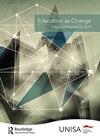Working with and through Neoliberalism: Envisioning Research Supervision as a Pedagogy of Care in a Context of “Privileged Irresponsibility”
IF 1
4区 教育学
Q3 EDUCATION & EDUCATIONAL RESEARCH
引用次数: 1
Abstract
The report of the Ministerial Committee on Transformation and Social Cohesion revealed that exclusionary practices are commonplace in South African universities. They remain a compelling factor that contributes to student attrition in Master’s and doctoral programmes, and they were a trigger to the #RhodesMustFall movement. Universities, oblivious to their doublespeak, have institutionalised curriculum decolonisation and delivery, yet simultaneously enforce neoliberal performative principles (fast-tracking increased numbers despite different levels of student readiness). The extent to which traditional, hierarchical research supervision models (with their genesis in an asymmetrical master-apprentice power dynamic) have responded to the needs of the euphemistically coined “non-traditional” student is moot. In a context of unprecedented increase in research supervision workloads and pressure to decolonise, there is limited research-informed knowledge as to how research supervisors navigate these contradictory conditions. This article reports on a study informed by a Freirean “pedagogy of care” as it attempts to address this lacuna by exploring the research supervision experiences and practice of a sample of 18 research-active professors in a College of Humanities at a research-led university in South Africa. Data was generated through in-depth interviews and subjected to reflexive thematic analysis. The findings indicate that a deep sense of care exists among the sampled supervisors and it manifests in various ways as supervisors actively work with and through neoliberal protocols.与新自由主义合作并通过新自由主义:在“特权不负责任”的背景下,将研究监督设想为一种护理教学法
转型和社会凝聚力部长级委员会的报告显示,排斥性做法在南非大学中很常见。它们仍然是导致硕士和博士课程学生流失的一个引人注目的因素,也是#RhodesMustWall运动的导火索。大学无视他们的双关语,将课程非殖民化和交付制度化,但同时执行新自由主义的表演原则(尽管学生准备程度不同,但人数仍在快速增加)。传统的、分级的研究监督模式(其起源于不对称的师徒权力动态)在多大程度上回应了委婉地创造的“非传统”学生的需求,这是没有意义的。在研究监督工作量空前增加和非殖民化压力的背景下,关于研究监督如何应对这些矛盾的条件,研究知情的知识有限。本文报道了Freirean“护理教育学”的一项研究,该研究试图通过探索南非一所研究型大学人文学院18名活跃于研究的教授的研究监督经验和实践来解决这一空白。数据是通过深入访谈生成的,并经过反射性主题分析。研究结果表明,被抽样的监管人员中存在着深刻的谨慎感,这种谨慎感以各种方式表现出来,因为监管人员积极与新自由主义协议合作。
本文章由计算机程序翻译,如有差异,请以英文原文为准。
求助全文
约1分钟内获得全文
求助全文
来源期刊

Education As Change
EDUCATION & EDUCATIONAL RESEARCH-
CiteScore
1.40
自引率
0.00%
发文量
29
审稿时长
24 weeks
期刊介绍:
Education as Change is an accredited, peer reviewed scholarly online journal that publishes original articles reflecting critically on issues of equality in education and on the ways in which educational practices contribute to transformation in non-formal, formal and informal contexts. Critique, mainly understood in the tradition of critical pedagogies, is a constructive process which contributes towards a better world. Contributions from and about marginalised communities and from different knowledge traditions are encouraged. The articles could draw on any rigorous research methodology, as well as transdisciplinary approaches. Research of a very specialised or technical nature should be framed within relevant discourses. While specialised kinds of research are encouraged, authors are expected to write for a broader audience of educational researchers and practitioners without losing conceptual and theoretical depth and rigour. All sectors of education are covered in the journal. These include primary, secondary and tertiary education, adult education, worker education, educational policy and teacher education.
 求助内容:
求助内容: 应助结果提醒方式:
应助结果提醒方式:


